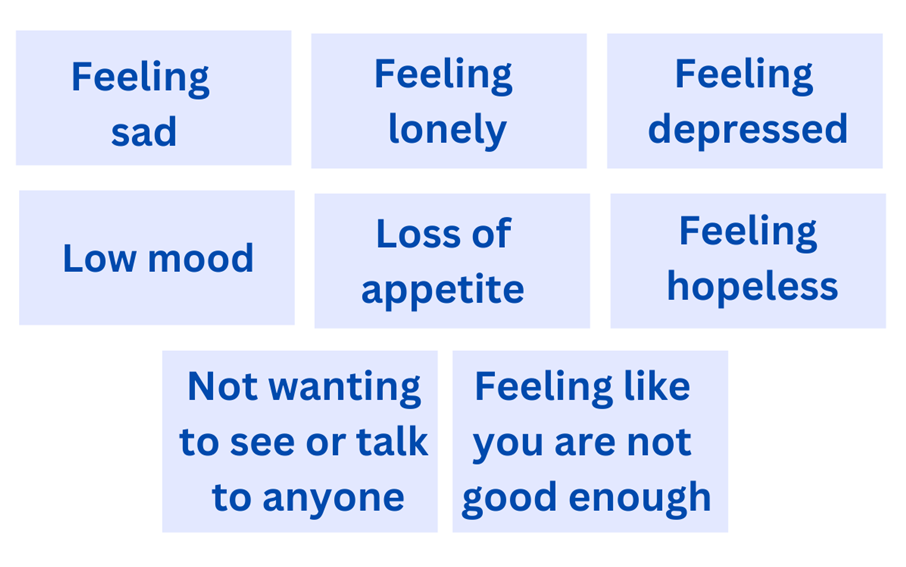Signs of poor mental health can include:

Sometimes these feelings can take over and make it difficult to cope. Therefore, it’s important to look after your mental health, to keep you feeling happy and healthy.
There are many things you can do to help improve your mental health and overall sense of wellbeing. Some of these include:
Keeping a routine
Changes, even small ones, can often trigger feelings of anxiety and stress. Try introducing a routine to your day to help give you more structure.
Physical exercise
Physical exercise can be very beneficial to a person’s mental wellbeing. Adding a short walk or some exercise like swimming into your routine can be a great way to do this.
Eating and drinking
Eating a balanced diet helps the body run more efficiently and can help you feel more alert. Try exploring different foods and food groups, cooked or prepared in different ways until your find something you like.
If you find it difficult to remember when to eat/drink, adding reminders to your schedule can be a useful way of prompting you. If you are struggling with your diet, speak to your GP to get some help and advice.
Wearing headphones, earplugs or ear defenders
Sensory overload can be a struggle for autistic people. Wearing headphones, earplugs or ear defenders can be an effective way of blocking out noises.
Self-soothe box
Using a self-soothe box can help calm and relax you, especially at times of extra stress.
Keeping a journal
Keeping a journal can be a great outlet to express how you are feeling. Try writing down your thoughts at the end of each day. You can also add drawings and pictures if you want to.
Practising mindfulness
Practising mindfulness can help with feelings of stress, anxiety, and depression. A daily mindfulness session can help promotes feelings of calmness and relaxation.
Get a good night’s sleep
Having a good night’s sleep helps the body to relax and work through the day’s activities. If you struggle to sleep, click here to find some techniques to help you sleep better.
Every person is different; exploring different techniques will help you to find what works best for you.
If you are struggling or worried about your mental health, speak to your GP to get some help and advice.
If you are having thoughts about harming yourself or suicide, it is important to speak to someone, contact one of the services below and get some help:
NHS 111
If you have urgent mental health concerns, you can call NHS 111 and press option 2.
You will be put through to a qualified call handler, who will be able to give you the advice and support you need.
This service is totally free and confidential and operates 24 hours a day, seven days a week
It is for all ages – so you can call this number if you are a parent or carer and need urgent mental health advice and support for a child or young person.
Alternatively, you can visit https://111.nhs.uk/ and follow the on screen instructions. This service is also staffed by the same qualified call handlers. It operates 24 hours a day, seven days a week and is free and confidential.
Please note however that this NHS 111 line is not an emergency service. Where
there is an immediate, serious and life-threatening emergency, you must call 999 or attend A and E.
Samaritans
Whatever you’re going through you can call us any time, from any phone for free on:
116 123
SHOUT
The UK’s first 24/7 crisis text service, provides free, confidential, 24/7 text message support in the UK for anyone who is struggling to cope. This service is free on all major mobile networks, for anyone in crisis, anytime.
Text SHOUT to 85258.




